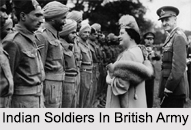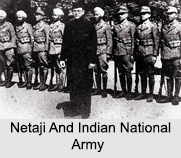 India and Second World War had much to do in moulding the attitude of Indian National Congress and other national leaders towards the combatants. During the Second World War India was controlled by the United Kingdom. Second World War which had engulfed the entire world by 1939 - 40s, had much effect on Indian politics. Indian attitude towards the Second World War was largely seen in the reaction of Indian National Congress.
India and Second World War had much to do in moulding the attitude of Indian National Congress and other national leaders towards the combatants. During the Second World War India was controlled by the United Kingdom. Second World War which had engulfed the entire world by 1939 - 40s, had much effect on Indian politics. Indian attitude towards the Second World War was largely seen in the reaction of Indian National Congress.
Contribution of Indian Soldiers in Second World War
Indian contribution in Second World War could be seen in all aspects of the war. India"s contribution to Second World War had a positive outcome in the shaping of South Asia and South East Asia, There were Indian heroes in Second World War, some are being recognised but for the most part unsung and who played a very important role during the war. However, one name that does stand out is of Noor Inayat Khan, the daughter of Ustad Inayat Khan, a well-known musician of Indian classical music. In 1942, she joined a secret British organisation, mandated to work behind opponent lines. She was captured by the Germans in 1943, tortured and ultimately executed. The Indian soldiers fought bravely in every battle of the war.
The Air Force pilots from India are renowned and well documented. Pilots like MS Pujji and Prithpal Singh"s exploits are among many who left their mark in the war. The Indian soldiers as part of the British Indian Army, fought against the Japanese. Over around 36,000 Indian soldiers lost their lives, 34,000 were wounded and 67,000 were taken prisoners of war. Indian doctors and nurses were deeply involved on the British soil and other countries.
Effect of Indian National Congress On Second World War
Indian attitude towards the Second World War was largely seen in the reaction of Indian National Congress. Congress which largely supported the British Allies in their war efforts were heavily perturbed with the changing attitude of the government .In spite of its support to the war against the Axis Powers, the national congress in 1936-39 repeatedly declared that it would resist any effort to use Indian men and money as well as resources in the war to serve the British imperialist interest. In 1937 it strongly objected to Indian government`s sending troops to China without India`s consent.
Further the effect of Indian National Congress was severe when on 3rd September 1939 the British government unilaterally associated India with the war on the side of Allied Powers without any consultation with either the provincial ministers or any of the Indian political leaders. The declaration reiterated the subordinate status of the Indians and their lack of independence despite the sizeable constitutional advances granted to the Indians under the Government of India Act, 1935.
 Reaction of Other Parties On Second World War
Reaction of Other Parties On Second World War
The reaction of other powers towards the second world war was much relaxed .For them the issue of joining the war was not so important rather to give a support to the existing government was much important which in the long run will grant them independence. The Liberal Federation supported the British Government as it believed the British promise towards the evolution of self rule. The Hindu Mahasabha supported the war because it gave them an opportunity to establish its own strength through a `general militarization of Hindus`. The Communist party on other hand followed the course of action suggested by the CPSU. The Muslim League viewed the war as a situation from which it could drive some profit for itself. The attitude of Indian National Congress was most acute.
Reaction of the British Government On Second World War
The British Attitude was entirely negative. By negating all pro - British sympathy and warnings of the consequences the government summarily rejected to define the British war aims and claimed that Britain was resisting aggression. In case of India it went on repeating that after the war the government would be willing to enter into consultation with the representatives of several communities as well as parties in India, with a view to secure their aid and cooperation in the framing of such modifications as might be required in the Government of India act of 1935. As an immediate measure the viceroy offered to set up a consultative body of the Indian politicians and princely representatives with no real powers whose advice might be sought by the government.
Soon it was realised that there was no common grounds between India and the crown on which India should support the British government in the war efforts. As such congress boycotted the offices under government and by November Congress was out of office. This led to growth of autocratic rule in many provinces. Also the refusal by Congress led the British government go closer to the Muslim league for support which automatically worsen the situation for Indian National Congress.
Thus in order to grip the support of the world as well as India the British government tried to appease the Indian masses with a number of offers and plans. During the war period the government tried to introduce the August Offer, along with the Cripps mission plan which was vehemently opposed by the Indian leaders.
Impact of Second World War on Indian Independence
The British had realised the ineffectiveness of holding on to their supremacy in India even before the World War II began. Second World War acted as a medium of India"s struggle for freedom but not before the British almost lost to Netaji"s Indian National Army. Indian National Army and Japanese forces were at last stopped by the British Army, with help of Indian soldiers, in Imphal and Kohima in the North East.
The Bengal Famine in 1943 was demoralizing for the Indian people but with the refusing of British to end the supplies from India that only strengthened the resolution of the nationalists in their call for sovereignty. As the Second World War came to an end, the British government in India began to start for departure.



















